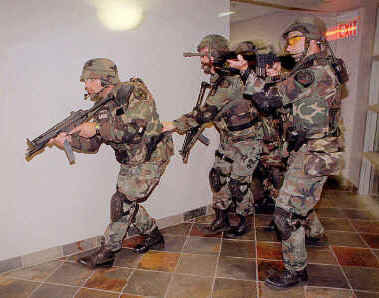
This was posted by Dr. Marc Lamont Hill, a buddy of mine and a regular analyst on CNN, FOX, ShowBiz Tonight and other shows. He's not only intelligent, but he is one of the great academic leaders of the 21st century.
After years of negotiation, Senators Dianne Feinstein and Orin Hatch were finally able to pass their anti-gang bill. In essence, the bill will make it easier to classify youth as members of gangs, and intensify the penalties for those who are charged with crimes. Despite its devastating implications, particularly for young people of color, the legislation was uncontested by Senate colleagues and publicly celebrated as a victory in the “War on Gangs.” As always, the language of war was used to sanitize a filthy set of politics.
For decades, politicians have used the rhetoric of war in order to draw public support for questionable domestic policy initiatives. In 1971, President Nixon launched a full scale “War on Drugs” that has heavily tipped the criminal justice scales against poor people, petty drug users, and small time dealers. More recently, after the September 11 tragedy, President Bush unleashed a War on Terror that has undermined any semblance of individual privacy and civil liberty for the entire nation.
In case you haven’t noticed, there is a disturbingly consistent pattern here. First politicians create a common enemy. Not a real enemy, but an indefensible bogeyman –say, a suicide bomber or a crack rock-- that we all agree is bad for society. Then they tell us that we are facing an immediate threat because of this bad entity. Once everyone is sufficiently (and irrationally) scared of our “enemy,” the government then prosecutes a war in order to snuff it out. Given the bellicose nature of American society, this becomes a reasonable if not axiomatic conclusion. After all, if you don’t support a war against bad things then you must a supporter of bad things, right?
By playing these language games, we are able to ignore clear evidence that these faux-wars don’t work. Thirty-six years into the current drug war, drugs are easier to find, cheaper to buy, and more potent than ever. Since the beginning of the war on terror, Americans have lost layers of freedom with no indication, regardless of what Bush says, that we are any safer. With the current war on gangs, we are bolstering a prison industry without affecting the root causes of gang membership and youth crime.
My suggestion is that we rename our wars in more honest fashion. Imagine how the public would respond if they knew politicians were proposing a “War on the Constitution” or a “War on Mexican Teenagers.” Perhaps, after recognizing the real stakes, we could begin a much-needed “War on Wars.”
Marc Lamont Hill
Assistant Professor of Urban Education & American Studies
Temple University
1301 Cecil B Moore Avenue
Philadelphia, PA 19122
215-204-1730
marchill@temple.edu
www.MarcLamontHill.com
"There came a time when the risk to remain tight in the bud was more painful than the risk it took to blossom" - Anais Nin
Other blogs with Your Black World
Dr. Boyce Watkins
Black Money
Black Celebrity Gossip
Hip Hop
Your Black Scholar
Black Television
Black Lawyers
Black History
Money
and Love
Black Politics
Black Global News
Dr. Boyce Watkins Blog
Black Love
Black Women
Black Power
Black Life
Black Writers
Black College
Hip Hop vs. America
Black Men
Black Gospel
Black Advice
Black Beauty
Black Education
Black News
Black Sports
Black Celebs
Black Health
Black Reviews
Black Fashion
Black Hair
African American Speakers
Black Media
Black in America
Black Men in America
Black Women
African American News




No comments:
Post a Comment